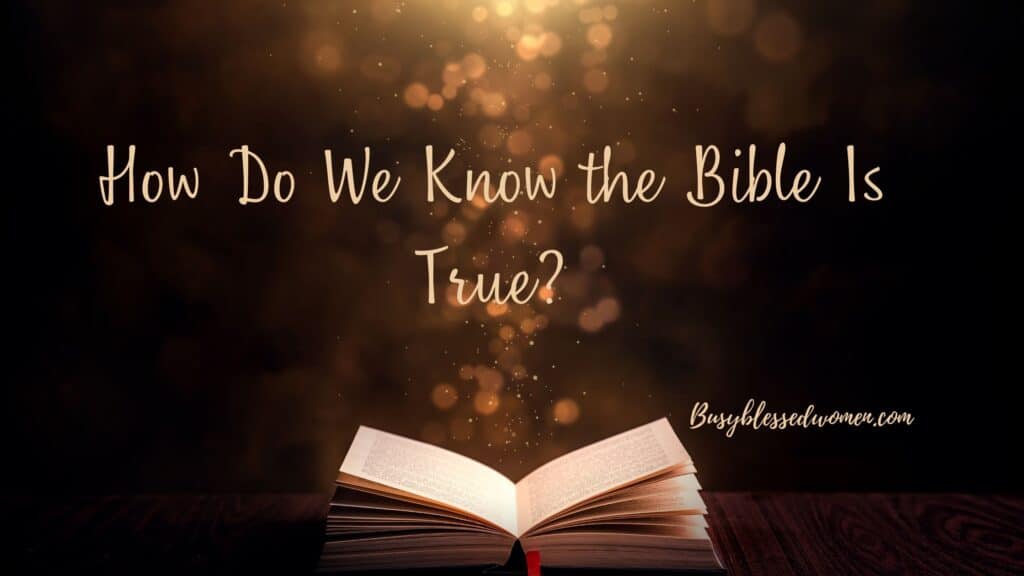I believe the Bible is true because it says so. (More on that later.) Not everyone agrees with that concept, and their arguments against the Bible vary. How do we know the Bible is true? How would you defend the Bible as the infallible (trustworthy) Word of God?

I approach polls with some skepticism, but the prevailing poll results of Christians who think the Bible is the accurate Word of God only fall somewhere in the 20th percentile.
Here’s one from 2022:
“The majority of Christians (58%) say the Bible is the inspired word of God but not everything in it is to be taken literally, while 25% say it should be interpreted literally and 16% say it is an ancient book of fables.” ¹
I will admit that this shocked me. I’d like us to come away with reasons the Bible is true by looking at the truthfulness, accuracy, and reliability of the Bible.
The Case for the Bible
Our Christian faith is based on the truths found in the Bible; we believe the Bible is the true Word of God. We call it “God’s Word” even though God did not physically put pen to stone, clay, or papyrus.
Who wrote the Bible? God is the Author, however, He worked through and inspired approximately 40 people to record His thoughts, plans, prophecies, and revelations.
The Bible is not one book, but 66 separate volumes joined into one. The authors wrote in three different languages -Hebrew, Aramaic, and Greek.
The time span of these writings was over a period of about 1500 years. It gives us factual accounts of real people who lived in actual places.
Much of the complaints about the Bible swirl around its accuracy. Considering the many copies and translations of the Bible, can we be sure this is the same as the real Bible? Can we truly trust the Bible?
A lot of the skepticism and false impressions of the Bible are misconceptions. They stem from a lack of knowledge of what the Bible actually says.
They may be conclusions that are based on second or third-hand information, not through actual firsthand reading and study.
How True is the Bible?
The Bible inspires us to know, love, worship, and follow God. We have faith in His teachings, but that doesn’t answer the question- is the Bible true? A look at the copious amount of evidence that supports the accuracy of the Bible will give us our answer.
The Bible is remarkably consistent, even though many people wrote it over a period of many years. Its theme throughout is the redemption of man- from the origin of our sin, the plan God made to redeem us, the coming of the Messiah, and His eventual return.
Is the Bible Reliable?
One of the more common skepticisms of the Bible is its reliability. Are we reading what the original authors wrote?
The Bible is unique in the sheer number of ancient manuscripts found and having the most surviving copies to check against each other. Any variants found were quite small and had to do with spelling and style.
Copying the Scriptures was a meticulous process set in place to keep the possibility of error extremely low. Among other things, they counted the number of letters, words, and lines and if two letters touched each other, the document was invalid. ²
Evidence for the Bible
The oldest copies of the Old Testament dated to 895 A.D. until the discovery of the Dead Sea Scrolls in 1947. This ancient treasure produced many copies of each book (except for Esther). They dated these scrolls between 100 BC and 100 AD.
There are also many other manuscripts from that era that are all astonishingly similar to these copies of Scripture. They include other Old Testament Hebrew and Aramaic manuscripts, a third-century Greek translation of the Old Testament, and many other writings.
The quantity of New Testament manuscripts goes even further.
The sheer number of New Testament manuscripts gives many opportunities to check for variants. None of the found variants concerned doctrine. Bible Scholars regard the New Testament to be 99.5% pure!³
Consider these numbers:
The New Testament has 5,800 Greek manuscripts, about 8000 Latin manuscripts, and another 1000 in other different languages.
In contrast, the total number of existing copies of the works of Plato (250), Aristotle (31), Caesar (75), and Tacitus (31)- (a great Roman historian)- (31) seem minuscule considering they are named as the greatest philosophers and historians.
There is no comparison. The quantity and quality of the Biblical writings far surpass other ancient manuscripts. If one wants to doubt the Bible’s reliability and authenticity, then one would have to doubt all other less substantiated ancient writings as well.
Which Version of the Bible is Closest to the Original?
When reading and studying your Bible, take care to choose your translation carefully. The authors should be a community of reputable Bible scholars (not just one person) that have studied the original languages.
This link is helpful in choosing what version may be best for you: The 5 Most Accurate Bible Translations – Faith Founded on Fact.
There are some popular translations to avoid that are definitely not Biblical: https://faithfoundedonfact.com/worst-translations-of-the-bible/
Is the Bible Historically Accurate?
Even with all these facts, some seek extra validation that the Bible is the true Word of God.
We find this validation through the specific and historical places, events, nations, kings, peoples, customs, etc. that archaeological discoveries have confirmed.
Events in the Bible That Have Been Proven
Many places in the Bible that were dismissed as myths are now confirmed.
These include the fallen walls of Jericho, King David’s reign, the second pool of Siloam (where Jesus restores the sight of a blind man), the Hittite people, and Goliath’s hometown, among others.
Notable people from the Bible that have confirmed archaeological evidence of their existence include Caiaphas’ (tomb found in 1990), King Herod (his tomb, as well as definitive Roman sources describing him as Matthew did), and Pontius Pilate (evidence discovered in 1961).
Archeologists also discovered an ancient clay cylinder in Babylon in 1879 and named it “The Cyrus Cylinder.” King Cyrus ordered it inscribed after he captured Babylon in 539 BC. It records how Cyrus allowed captive peoples to return home, which correlates with 2 Chronicles 36:22-23 and Ezra 1:1-4.
Multitudes of discoveries related to the Bible authenticate customs of the day.
One of these discoveries are the Nuzi Tablets found in present day Iraq; discovered right before World War 1. They demonstrate the following customs were all authentic cultural practices found in the Bible-
The “servant heir” custom (Genesis 15:2), the firstborn birthright sales (Genesis 25:31), and the use of household idols (Genesis 31:19), among many others.
These historical finds provide outside evidence of factual Biblical details that support the accuracy of the Bible.
Again, if you want to doubt factual findings in relation to the Bible, then you would have to apply them to secular history and culture as well.

Proof the Bible is True
Another important piece of evidence that the Bible is true is the substantial number of fulfilled prophecies. The Bible has fulfilled approximately 2000 out of the 2500 prophecies with perfect accuracy.(4) Some are to be fulfilled in the future.
Jesus fulfilled every one of the Messianic prophecies written about Him. The mathematical probability of Jesus fulfilling even eight prophecies would be 1 in 10 to the 17th power!(5)
That’s 17 zeros! How could this happen if not for the power of God at work?
Is the Bible Factual?
How do we know the Bible is factual?
Because the people who wrote the Bible were direct eyewitnesses or recorded eyewitness testimony. John even gives testimony to this in his Gospel:
“And he who has seen has testified, and his testimony is true; and he knows that he is telling the truth, so that you also may believe.” John 19:35.
Peter also says, “We were eyewitnesses of His majesty.” 2 Peter 1:16b.
Jesus taught Matthew and John for 3 years as they traveled with Him. Luke was a close friend and companion of Paul who, “who carefully investigated everything from the beginning.” Luke 1:1-4. Mark was a disciple of Peter and accompanied Paul on his first missionary journey.
All four Gospels give the same accounts of many of the stories from Jesus’ life and teachings. Each Gospel writer, however, was writing to a different audience and tailored their emphasis to them.
While their style was unique to their audience, the facts are the same.
Bible scholars also believe that these four men wrote the Gospels close to the time of Jesus’ death- approximately 40 to 60 years later. This is important because many people were still alive at the time these four men were writing their books. They could attest that the writings were true.
Others who wrote manuscripts about Jesus included the same details in their writings that the Gospel writers did. (Tacitus, Jewish Rabbinical writings, Jewish historians, Roman governors, and others.) That’s more confirmation that Jesus did and said what was written in Scripture.
Truthfulness of God
All the wisdom in the Bible comes from God. The Holy Spirit worked through men to write truths that came from God Himself. His words are Spirit and life. (John 6:63) Here are a few verses that make clear the truthfulness of Scripture.
Verses about the Bible being True
“All Scripture is God-breathed and is useful for teaching, rebuking, correcting and training in righteousness.” 2 Timothy 3:16
“You must understand that no prophecy of Scripture came about by the prophet’s own interpretation.” 2 Peter 1:20
“Make them holy by your truth; teach them your word, which is truth.” John 17:17 (A prayer from Jesus to His Father after the Last Supper.)
“All your words are true; all your righteous laws are eternal.” Psalm 119:160.
“Every word of God is flawless.” Proverbs 30:5a.
“As for God, his way is perfect; the word of the Lord is flawless.” Psalm 18:30.
Know the Bible
Is the Bible real? Yes, preserved documents with excellent accuracy exist.
Is the Bible true? Yes, historians and archaeologists give us overwhelming evidence.
We stand on a firm foundation for believing the Bible is truthful, reliable, and accurate. It is the inspired record of God’s revelation to us of Himself and His will. The Bible we read today is about people, places, and events that existed and happened.
The message and worldview are consistent throughout the entire book. We learn the nature and will of our unchanging and sovereign God, our path of salvation through Jesus, how we are to live our lives, and what to expect in the future.
The countless lives that the Bible has changed add to its reliability and truthfulness. The redeemed come from all walks of life, with the most astonishing being the most unreached tribe, the atheists and the skeptics.
Is the Bible Real?
Answers to your questions about the Bible aren’t difficult to find if you take the time to explore the abundant evidence that exists. Let your questions about the Bible drive you to inspect these claims for yourself.
There will always be those who don’t believe in the truth and reliability of the Bible. Jesus performed many miracles in the presence of a multitude of people, yet they still would not believe in Him.
Don’t let this discourage you from being a faithful witness to the truthfulness of the Bible. Our job is to plant the seeds; the Holy Spirit will take care of the rest!
Blessings!
AnnMarie
All Scripture is taken from the NIV unless specified otherwise.
¹https://news.gallup.com/poll/394262/fewer-bible-literal-word-god.aspx ¹
²https://scottmanning.com/content/process-of-copying-the-old-testament-by-jewish-scribes/
³Arthur Asuncion’s Official Site: Is The Bible Accurate And Reliable In Transmission? (uci.edu)
5 https://bible.org/illustration/probability-prophecies-fulfilled
Photo Credit: Canva

This was excellent, Ann. I’ve read many apologetics books (Bible Study and on my own) and you captured the best and most relevant thoughts and facts in just one blog post!
So good to read that you’re back to sitting at your computer again…and doing God’s work. You are blessing many!
Thanks so much, Cindy! It was hard to break down the copious amounts of facts that are out there! It was so exciting to know, however, that all we need and MORE is there for those who seek truth 🙂